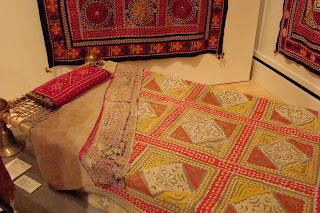So this is where it starts. An exhibition of quilts from India, Pakistan & Bangladesh, South Asian Seams at the International Quilt Center & Museum. I was in Lincoln, Nebraska for the Textile Society of America conference where I first presented research on quilts and this blog. I had walked through the first room past quilts from Bangladesh, West Bengal, Bihar, Maharasahtra, Karnataka, Rajasthan, Gujarat--then round a corner into the second room, and here it was a charpoy (bed/day bed) covered with a quilt from Southern Sindh in Pakistan. The applique technique is a hallmark of the work of the Muslim Charhan quilters, which often includes mirrors and sequins. This quilt was made sometime between 1950 and 1980.
Yet that's the technical part, my response to coming across the charpoy extends even wider and deeper than my interest in quilts...all of a sudden
I was a child and living a Quetta, Baluchistan in the Kachhi Desert region close to the Khyber Pass and Afghanistan.
So this is where I am starting a new body of writings, writing, which moves to and from across the boundary between inner and outer worlds, private and public territories (to quote Jane Rendell). It takes the exhilaration, and this charpoy as one of its starting points. Within this is a personal question about what it means to be foreign, which the Oxford Dictionary defines as: of or from or situated in or characteristic of a country or a language other than one's own. To be an outsider. Perhaps Deleuze & Guatarri are more helpful: the life of the nomad is the intermezzo.
And there are other starting points--a collection of black and white photographs.
 These are not annotated, they come from a dark green photograph album but most have come away from the page so are jumbled. I can recognise my parents, my brother, myself. For the rest I must rely on memory.
These are not annotated, they come from a dark green photograph album but most have come away from the page so are jumbled. I can recognise my parents, my brother, myself. For the rest I must rely on memory.
References:
Jane Rendell, 'Site Writing', p67
Deleuze & Guatarri, A Thousand Plateaus', p419
See other pages in this blog: 'About this project' and 'Ralli Quilts' for more information
Yet that's the technical part, my response to coming across the charpoy extends even wider and deeper than my interest in quilts...all of a sudden
I was a child and living a Quetta, Baluchistan in the Kachhi Desert region close to the Khyber Pass and Afghanistan.
So this is where I am starting a new body of writings, writing, which moves to and from across the boundary between inner and outer worlds, private and public territories (to quote Jane Rendell). It takes the exhilaration, and this charpoy as one of its starting points. Within this is a personal question about what it means to be foreign, which the Oxford Dictionary defines as: of or from or situated in or characteristic of a country or a language other than one's own. To be an outsider. Perhaps Deleuze & Guatarri are more helpful: the life of the nomad is the intermezzo.
And there are other starting points--a collection of black and white photographs.
 These are not annotated, they come from a dark green photograph album but most have come away from the page so are jumbled. I can recognise my parents, my brother, myself. For the rest I must rely on memory.
These are not annotated, they come from a dark green photograph album but most have come away from the page so are jumbled. I can recognise my parents, my brother, myself. For the rest I must rely on memory.References:
Jane Rendell, 'Site Writing', p67
Deleuze & Guatarri, A Thousand Plateaus', p419
See other pages in this blog: 'About this project' and 'Ralli Quilts' for more information



No comments:
Post a Comment